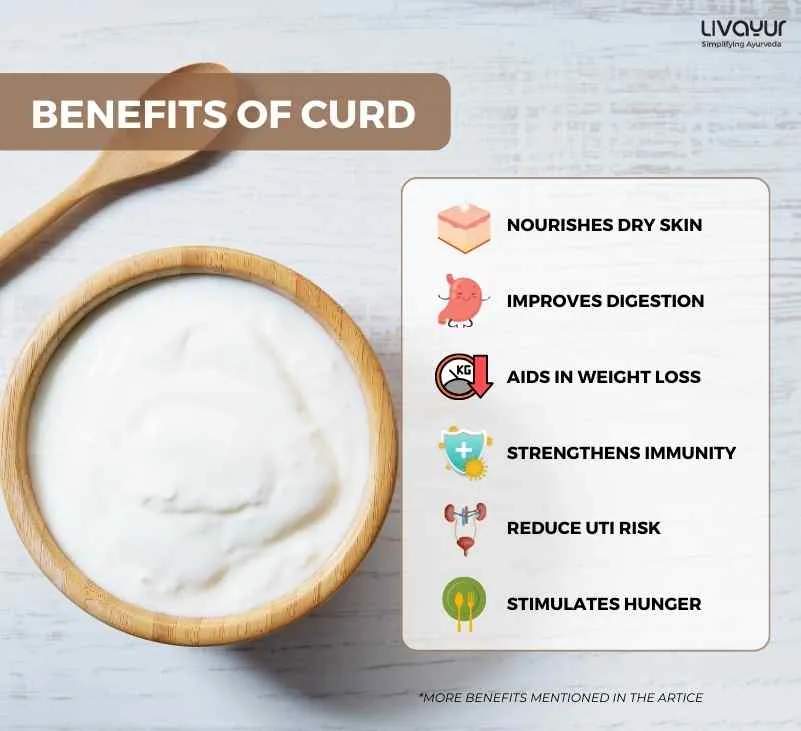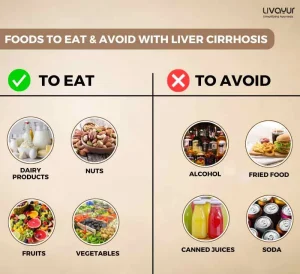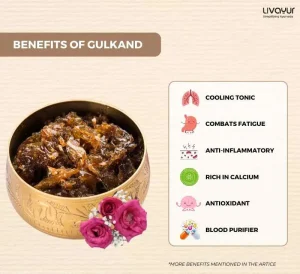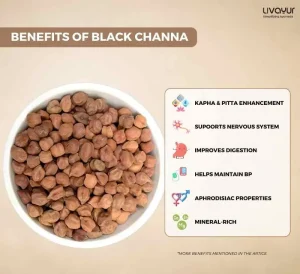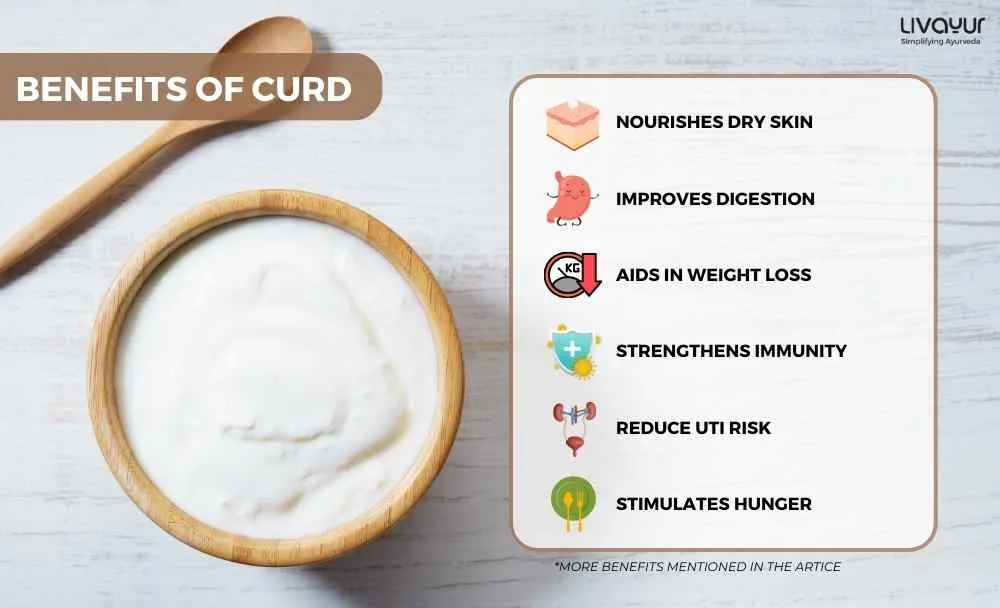
“अन्नम ब्रह्म रसं विष्णुं भोक्ता देवो जनार्दनम् एवम् ध्यातव तथा ज्ञत्व अन्न दोषो न लिप्यते।
Annam brahma vishnu bhokta devi janaardanm aevam dhyaatav tatha gyaatv ann doshi na lipyate
Food is Brahma, the essence in it is Vishnu, and the one who consumes (enjoys) it is Maheshwara the Lord Himself.”
Curd or Dahi in India is considered a pious ingredient, used in havans and pujas, and even mixed with the prasadam. Also, Dahi is an indispensable addition to every traditional Indian thali. But what is curd/dahi & how does it help your body and overall health? This article will introduce you to the various curd benefits. However, before we move on to the curd benefits, we’ll try to understand how curd is made and what Ayurveda says about curd.
Curd is a fermented milk product rich in probiotics. [1] The fermentation is brought about by the Lactic Acid bacteria ( LAB), which acts on the milk and results in milk curdling. [1] Curd is known for its smoothness, thickness, rich texture, and refreshing taste. In Ayurveda, Curd is known as ‘Dadhi’. It is hailed for its nutritional value, rich in bioavailable vitamins, minerals, and folate. In many Ayurvedic texts, we find a mention of Dadhi. According to Ayurveda, Curd or Dadhi is hot or Ushna in potency and unctuous or Snigdha. [2]
Curd is the fermented form of milk and retains many of the properties of milk. However, the curd is more guru (heavier) and Abhishyandi, compared to milk. The curd that’s made from boiled milk is Pitta and Vata-pacifying, while the curd that’s made by filtering, aggravates Kapha and reduces Vata.
Now, we will cast a glance at the several Curd (Dadhi) benefits:
Benefits of Curd for hair

- Dandruff-remover
The curd hair mask is great for dandruff. The anti-inflammatory attributes of curd can soothe the itchiness and scalp irritation caused by dandruff. [4]
- Hair strengthener
Curd is capable of strengthening your hair shafts and preventing frequent hair breakages. The Zinc and Vitamin B content and the high amounts of probiotics in curd the hair fortifier, promoting the health of the hair follicles too. [5]
- Frizz de-tangler
One of the benefits of curd for hair includes its moisturizing ability to soften and smoothen dry, frizzy hair. The high-fat content of curd allows this.
- Scalp cleanser
Curd can be an excellent scalp cleanser. The Lactic Acid in curd can remove all flaky, dead skin cells from your scalp.
Curd benefits for skin

1. Fights Acne
Curd is antimicrobial and it can destroy acne-causing bacteria. Apply curd on the face to bid goodbye to acne, pustules, comedones, and pimples. [6] Also, curd may be applied to areas affected by fungal skin infections.
2. Nourishes Dry Skin
One of the benefits of eating curd is that you can get soft and supple skin. Dryness and itchiness are bashed aside, and your skin looks well moisturized. [7]
3. Shrinks Large Skin Pores
Curd has enough lactic acid, which can reduce the size of your skin pores. Applying curd on the face twice a week can help you experience the benefits of curd on the face.
4. Lightens Dark Spots
Vitamin B 5 in curd can act on spots, pigments, and blemishes on your skin to give you a spotless bright skin texture. [7].
5. Improve Skin’s Elasticity
Applying curd to the face can reverse the sagging effect on aged skin, and improve suppleness and elasticity. [7]
6. Gives Relief from Sunburns
When curd is topically applied to sun-damaged areas, its cooling or sheetal impact can soothe the skin, and relieve the discomfort.
Health benefits of curd

1. Improves Digestion
Curd, being a probiotic food, benefits your natural gut flora and improves your digestion power. It is great for treating an upset stomach/diarrhea, gastritis, etc. [2]
2. Aids in Weight Loss
Curd can inhibit the production of stress hormones like cortisol, curbing your untimely hunger pangs and reducing the risk of obesity. [3]
3. Helps with High Blood Pressure
Curd has a high content of magnesium, which plays a key role in treating high blood pressure. [3]
4. Enhances a Man’s Sexual Health
The creamy curd can Vrushya action, accelerating the production of semen and causing more powerful ejaculations. [8]
5. Strengthens Immunity
The active and live cultures in curd can act as an immunity booster by killing the disease-causing microbes. Curd creates a good defense against infections and allergies. [3]
6. Stimulates hunger or appetite
The tangy taste of curd stimulates your taste buds and improves your appetite. This is one of the notable curd benefits. [2]
7. Can Help with Lactose-Tolerance
If you are intolerant to Lactose, curd may help you by making your body get used to lactose bit by bit. However, this journey from lactose intolerance to lactose tolerance may not happen for all. It depends on an individual’s body constitution. [3]
8. Lowers the Risks of Cancer
Scientific evidence shows that taking curd can substantially reduce the chances of certain cancer types, such as colorectal cancer. [3] Also, the vitamin B12 content in curd can treat the vitamin B12 deficiency that cancer patients tend to suffer from.
9. Treats Urinary Tract Infections
The good bacteria in curd reduce UTI risk and also manage the painful symptoms of a urinary tract infection. Thus, a bowl of curd is a must-have for someone who is suffering from a UTI. [3]
10. Helps with Rhinitis
Curd triggers digestion of the Ama due to its hot potency. Therefore, it is beneficial against allergies, and both acute as well as chronic Rhinitis. [8]
Nutritional Value of Curd
| Sr. No. | Nutrition | Value (per 100gms) |
| 1 | Total Fat | 4.2g |
| 2 | Saturated Fat | 2.658 g |
| 3 | Polyunsaturated Fat | 0.129g |
| 4 | Monounsaturated fat | 1.194g |
| 5 | Cholestrol | 14mg |
| 6 | Sodium | 371mg |
| 7 | Protein | 11.75g |
| 8 | Calcium | 72mg |
| 9 | Iron | 0.13mg |
Properties of Curd
Ayurveda classifies three varieties of dahi (curd) according to flavour. Sweet, sour, and too sour, curd has an astringent secondary taste, is heated and unctuous, and relieves emaciation, anorexia, dysuria, diarrhea, and chronic coryza. It is aphrodisiac, and energizing. Curd formed from boiled milk pacifies Vata and Pitta, and develops Dhatu, Agni, and vigor. (11)
How to Consume Curd
Curd can be consumed just as is. However, it is suggested to consume curd with Awla (Indian gooseberry), green or yellow moong dal, honey, ghee, or mishri (raw, unrefined sugar). You can aslo churn the curd with some water, a pinch of turmeric and some rock salt and make buttermilk out of it. This can help in balancing digestion and reduce the production of toxins. (12)
What is the Best Time to Eat Curd
It is advisable to eat curd anytime during the day (preferably after a meal), but definitely not at night. Ayurveda also suggests you consume curd with honey or ghee. (11)
Side Effects of Curd
While consuming curd can have numerous benefits on your body, it is advisable to consume curd in moderation as excess amount of curd can lead to:
- Digestive issues
- Weight gain
- Combining with incompatible foods can lead to serious illnesses like arthritis, infertility, etc.
Hence it is advisable to consume curd in moderation.
Conclusion
There are multiple health benefits of curd (Dahi). Also, there are a host of beauty benefits of curd. It has a high nutritional content and can improve your health and appearance in manifold ways. Including fresh curd in your daily diet will be a wise decision. However, before incorporating curd into your diet, you must talk to an Ayurvedic expert.
Disclaimer
This article is written from a health and wellness perspective and is not medical advice. All benefits of curd mentioned here are entirely for knowledge-gatherings and depend upon individual body constitution. Kindly seek the help of a certified medical practitioner before initiating any treatment.
FAQs
• What are the three major types of curd?
The three types of curd are:
1. Curd from Cow’s Milk (Gavya Dadhi)- This curd pacifies the Vata Dosha.
2. Curd from Buffalo’s Milk (Mahisa Dadhi)- This curd is thick, fatty, and heavy. It vitiates the Rakta.
3. Curd from Goat’s Milk (Aja Dadhi)- This curd is Tridosha-pacifying. [2]
• How is curd rice made?
Curd is an integral part of many Indian recipes. One such recipe is curd rice. To make curd rice, you need to follow the given steps:
1. Mix curd with pre-cooked rice.
2. Heat oil in a Kadhai. Add mustard seeds, urad dal, chana dal, broken dry red chilies, chopped green chilies, grated ginger, and a pinch of hing.
3. When the spices crackle, turn the flame off.
4. Pour in the tadka to temper the curd-rice mix.
5. To garnish, add finely chopped salad veggies like carrots, onions, and cucumbers.
6. Serve with pickles or papad.
One of the curd rice benefits is that it acts as a tasty comfort food for the summers.
• According to taste, what are the three varieties of Curd?
Acharya Sushruta categorized curd into the following three types:
• Amla (Sour)
• Madhura (Sweet)
• Ati-amla (extremely Sour) [9]
References
- Probiotic potential of lactic acid bacteria present in home made curd in southern India
- Dadhi
- BIOGENIC SECRETS OF CURD: THE AYURVEDIC APPRAISAL
- Dairy Intake and Acne Vulgaris: A Systematic Review and Meta-Analysis of 78,529 Children, Adolescents, and Young Adults
- Clinical efficacy of facial masks containing yoghurt and Opuntia humifusa Raf. (F-YOP)
- A CRITICAL UNDERSTANDING OF NUTRACEUTICAL ASPECTS OF CURD IN AYURVEDA
- Traditional And Modern Scientific Approaches For The Uses Of ‘Takra’ In Different Diseases: A Review
- https://www.researchgate.net/publication/334389181_A_Research_on_Consumption_Pattern_and_Attributes_of_Curd
- https://www.researchgate.net/publication/376018050_Therapeutic_use_of_Curd_in_Digestive_Disorders_in_Ayurveda
- https://saatwika.in/how-to-eat-curd-according-to-ayurveda/




